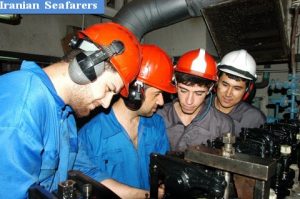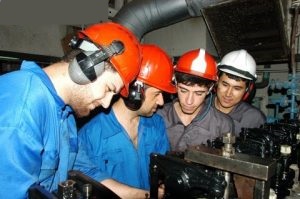A career as a ship engineer is a highly sought-after profession in the maritime industry. As with any profession, experience is key to success, and one way for aspiring ship engineers to gain experience is through a cadetship program. In this article, we will discuss how ship engineering cadets can gain experience in engine room watchkeeping on commercial ships.

What is a Ship Engineer Cadet?
A ship engineering cadet is an individual who is undergoing training to become a qualified marine engineer. Cadetship programs are typically offered by maritime academies or shipping companies, and they provide a combination of academic and practical training. During the program, cadets are assigned to various vessels, where they gain hands-on experience in different aspects of marine engineering. A ship engineering cadet is an individual who is training to become a qualified marine engineer. It is a role that requires a combination of academic and practical training, and cadetship programs are typically offered by maritime academies or shipping companies.
The role of a ship engineering cadet is to work alongside experienced marine engineers to learn the skills required to become a qualified marine engineer. This involves gaining hands-on experience in the operation, maintenance, and repair of ship engines, propulsion systems, electrical systems, and other equipment. In addition to practical training, cadets also undergo academic training, which typically includes coursework in marine engineering, mathematics, physics, and other related subjects.
IMO’s STCW Convention and Ship Engineer Cadetship
In the maritime industry, the training and certification of ship engineering cadets are regulated by the International Maritime Organization’s (IMO) Standards of Training, Certification, and Watchkeeping (STCW) Convention. The STCW Convention sets out the minimum training and certification requirements for seafarers, including ship engineering cadets.
Under the STCW Convention, ship engineering cadets must undergo a structured training program that includes both academic and practical training. The program must be approved by the relevant maritime authority, and it must meet the minimum standards set out in the convention. Once the cadet completes the training program, they must pass a series of assessments and exams to demonstrate their competency.
It is important to note that the STCW Convention does not require shipping companies to hire ship engineering cadets. However, many companies do choose to offer cadetship programs as a way of developing their own talent pool and ensuring a steady supply of qualified marine engineers for their operations.
In conclusion, a ship engineering cadet is an individual who is undergoing training to become a qualified marine engineer. While it is not mandatory to have such a service according to IMO STCW Convention and regulations, many shipping companies offer cadetship programs as a way of developing their own talent pool and ensuring a steady supply of qualified marine engineers for their operations. The training and certification of ship engineering cadets are regulated by the STCW Convention, which sets out the minimum standards for their training and competency.
Engine Room Watchkeeping
Engine room watchkeeping is one of the most critical responsibilities of a ship’s engineer. It involves the monitoring and maintenance of the ship’s propulsion and auxiliary machinery to ensure the vessel’s safe and efficient operation. During a cadetship program, engineering cadets will be assigned to engine room watchkeeping duties, where they will work alongside experienced engineers to learn the ropes.
One of the primary tasks of an engineering cadet in engine room watchkeeping is to maintain the engine room logbook. The logbook contains critical information about the vessel’s machinery, including operational parameters, fuel consumption, and maintenance activities. Cadets must keep the logbook up-to-date, as it is a crucial document for monitoring the vessel’s performance and complying with regulatory requirements.
In addition to logbook maintenance, engineering cadets will assist with routine maintenance activities, such as oil changes, filter replacements, and equipment inspections. They will also learn how to troubleshoot and diagnose problems with the ship’s machinery and assist with repairs as needed.
Safety is paramount in the engine room, and cadets will receive extensive training on safety procedures and protocols. They will learn about fire prevention and suppression, electrical safety, and emergency response procedures. Cadets will also be trained on the proper use of personal protective equipment (PPE), such as safety glasses, gloves, and hard hats.
Advancing to Higher Positions
As cadets gain experience in engine room watchkeeping, they will have the opportunity to advance to higher positions within the engineering department. This may include roles such as assistant engineer or second engineer. These positions come with increased responsibilities and require a higher level of technical knowledge and expertise.
To advance to higher positions, engineering cadets must demonstrate proficiency in engine room watchkeeping duties and show a willingness to learn and take on new challenges. They must also meet the requirements for certification set forth by regulatory bodies such as the International Maritime Organization (IMO).
Benefits of Cadetship Programs
Cadetship programs provide numerous benefits to aspiring ship engineers. First and foremost, they offer the opportunity to gain hands-on experience in engine room watchkeeping and other aspects of marine engineering. This experience is invaluable for developing the technical knowledge and skills needed to succeed as a ship engineer.
Cadetship programs also provide opportunities for networking and building relationships within the maritime industry. Cadets will work alongside experienced professionals who can serve as mentors and provide guidance and advice as they progress in their careers.
Additionally, cadetship programs often provide financial support to participants, including tuition assistance and a stipend for living expenses. This support can make it easier for individuals from diverse backgrounds to pursue a career in marine engineering.
Ship engineering cadetship programs provide an excellent opportunity for aspiring marine engineers to gain experience in engine room watchkeeping and other aspects of marine engineering. Through hands-on training and guidance from experienced professionals, cadets can develop the technical knowledge and skills needed to succeed in this challenging and rewarding profession. As cadets progress in their careers, they will have opportunities to advance to higher positions within the engineering department and make a significant contribution.

Overcoming Challenges as a Ship Engineering Cadet
Like any other profession, commercial ship engineering cadets face a range of challenges during their training and career. Here are some of the most common challenges that cadets may face and ways to overcome them:
- Balancing academic and practical training: Ship engineering cadetship programs combine academic and practical training. Cadets need to manage their time effectively to ensure that they can keep up with their coursework while also gaining practical experience. Time management skills and effective study habits can help cadets balance these two aspects of their training.
- Adapting to life at sea: Life at sea can be challenging for many cadets, particularly those who are new to the industry. They may experience seasickness, homesickness, and isolation. It is important to maintain a positive attitude, take care of one’s health, and stay connected with loved ones back home.
- Dealing with equipment breakdowns and emergencies: The ship’s engine room is a complex and potentially dangerous environment, and cadets may face unexpected equipment breakdowns and emergencies. It is crucial to remain calm and follow established protocols and procedures to ensure the safety of the crew and the vessel.
- Communication barriers: The maritime industry is diverse, and cadets may find themselves working with colleagues from different backgrounds and nationalities. Communication barriers can arise due to differences in language and culture. Improving language skills and learning about different cultures can help cadets communicate effectively and work collaboratively with their colleagues.
- Dealing with hierarchy and authority: The maritime industry has a hierarchical structure, with clear lines of authority and responsibility. Cadets may need to adjust to taking orders from senior officers and following established procedures. It is important to understand and respect the chain of command while also being proactive and contributing to the team’s success.
- Coping with stress and mental health issues: Life at sea can be stressful, and cadets may face mental health issues such as anxiety and depression. It is essential to maintain a healthy lifestyle, including regular exercise, proper nutrition, and adequate sleep. Seeking support from colleagues, friends, or mental health professionals can also be helpful.
In conclusion, commercial ship engineering cadets face a range of challenges during their training and career. Effective time management, a positive attitude, effective communication, following established procedures, and maintaining a healthy lifestyle can help cadets overcome these challenges and succeed in their careers.
Prepared by MaritimEducation team.

